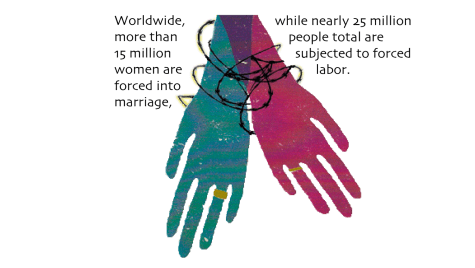Her story: Women across the world are making history theirs
Credit: Gina Ricards | The DePaulia
It’s called “Herstory” because it’s “her” story – history being told from a female or feminist perspective.
So much of American history has been told from the white male perspective, and it’s no surprise that the term “herstory” emerged in the second wave of feminism in the 1970s.
Herstory wasn’t created to devouch men’s history or to dismiss their successes, but to shed light and to welcome men into listening to our stories and the lesser-known stories of women that have helped shape movements and news paths forward for women’s liberation.
After the 19th amendment was passed, granting all American women the right to vote, it marked a milestone at the end of first wave feminism that set a path for future movements.
“The women’s movement of the 1960s and 1970s really opened the door for women not to be bound by their roles in the home, and subsequent waves of feminism have become more inclusive and intersectional,” said DePaul English Professor Michele Morano. “Of course these waves have opened up the education system so that women’s history, literature, art, etc. offer many models of strong and accomplished women.”
When World War I came about and men went to war, it brought a lot of change for women. The workforce began to change and women were given the new responsibility to work and make money.
After this change, women no longer wanted to go back to the “hearth and home” lifestyle of being housewives, mothers, and caretakers towards their families.
Birth control became more accessible and soon sex was not all about children or creating a family, but about pleasure. Women were freer to make their own decisions about their futures, they were no longer bonded to the ties of being housewives and mothers, but were able to pursue work, higher education, and independence from men.

Throughout the waves of feminism and fight for women’s liberation, there have been many steps towards a woman’s right to abortion, vote, marriage, as well as many advances in a woman’s role in the work industry.
We are blessed here in America with a foundation of strong women that laid the groundwork for the lifestyles we get to live in today. But we can’t be blinded by our own successes to not acknowledge the challenges that women all over the world are still fighting for today and even what in America, we are still subjected to.
DePaul junior Annie Toner reflected upon some common challenges women in America and all over the world still face today. “I think the sexualization of women is still very prominent today,” she said. “Many of our actions and choices are seen through a sexual lens which I feel many women are pushing against.”
Despite progress in feminist movements, gender inequality still exists today all over the globe.
“There are many countries where women are noticingly treated as second class citizens,” Toner said. “It was even in 2018 where the first woman was allowed a driver’s license in Saudi Arabia. As feminists, it is important we recognize that there are people around the world struggling to receive basic rights because they are a woman and it is crucial to be a helping hand in their fight for rights.”

According to the United Nations Foundation, pregnancy complications are still the leading cause of death for adolescent girls and one in three women experience some sort of violence in their lifetime whether it be domestically or by a stranger.
All over the world, rape is a common fear that women have to face but specifically in India, the experiences are extremely high. After suffering ten to fifteen years of hundreds of thousands of rape cases, the Indian government does not really care about the issue and does not support women on the fight against it. According to NPR, only a third of rape cases reported to the police in India actually result in a conviction. At the end of 2017, Indian courts had a backlog of more than 100,000 rape cases.
Patriarchal values are all around the world cause men to act viciously towards women, simply because they are not held accountable for their actions and get to act with certain privileges.

Many women and groups in India are fighting for the end against old patriarchal practices in order to reduce sexual violence and rape, but little can be done without the support of their government.
India is not the only country in which women are fighting against patriarchal abuse, but dozens of countries in the Middle East and in Africa are still subjecting women to child labor and forced marriage.
According to NBC News, Dubai’s Sheikh Mohammed bin Rashid al-Maktoum was recently reported for allegedly lining up his 11-year-old daughter to marry the Saudi Crown Prince, Mohammed Bin Salman, who is 22 years older than her.
Acting on cultural traditions in societies in which are ruled with a patriarchal system, different agencies around the world arrange marriages for young girls. According to the Tablet, it’s a problem in many countries that girls as young as 12 or 13 can be forced or sold to marry men that can be as old as 70.
Worldwide, more than 15 million women are forced into marriage, while nearly 25 million people total are subjected to forced labor.
In America, women are fortunate to have fought for the rights we have today, but we can’t ignore the countries all over the world whose women are still facing harsh gender inequality and discrimination while trying to progress ours further.







